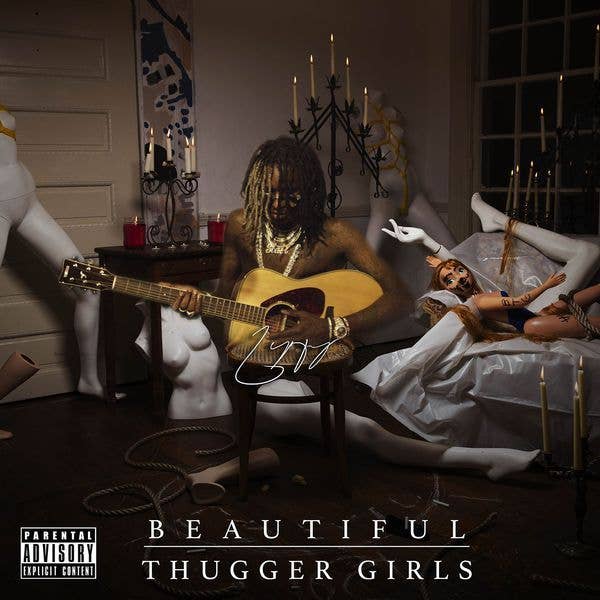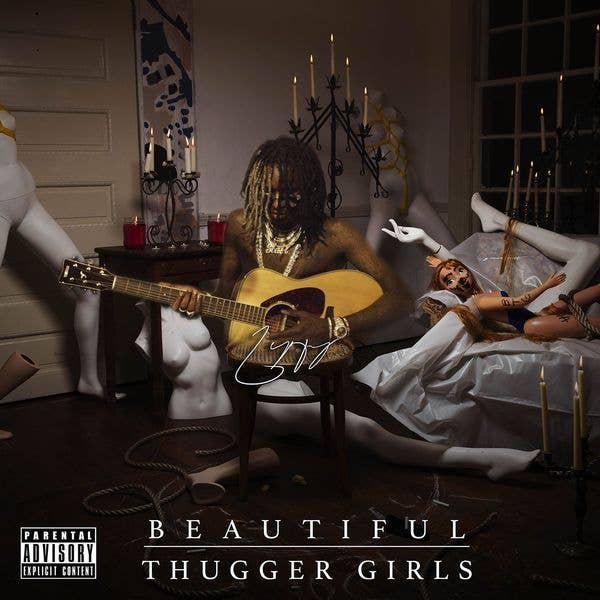
The cover art for Beautiful Thugger Girls, Young Thug’s debut album, executive produced by Drake (jk, lol), is perplexing. Young Thug sits alone in a four cornered room staring at a guitar. Lit candles and splayed mannequins surround him. Some nude, some limbless, some bound by rope, all plastic, the dummies lack distinction, pale in the glow of Young Thug’s guitar. Thug looks pale and, inexplicably, he has no legs. Is he disintegrating? Back to that in a second: Are these the beautiful thugger girls? How does Young Thug define beauty? Is Thug singing to them? Do they like his singing? Is Young Thug singing country music?
These are fruitless questions, but the urge to even ask them speaks to Young Thug’s perpetual mystique. Young Thug introduced Beautiful Thugger Girls as his “singing album,” and indeed, Thug does sing, as he has always done, but BTG isn’t a record about singing or girls or even his fiancée, and it’s definitely not a country album, despite the acoustic guitars. More elusively, it’s an album about dissolution, into love, into lust, into family, into the music. Young Thug has spent his career distinguishing himself, in fashion and in expression, and here he reaches the logical endpoint of all that idiosyncrasy: loneliness.
R&B, the album’s most consistent musical mode, fits this theme well, allowing Thug to articulate his isolation yet remain grounded, the quintessential love story. For Thug, love is pure, crude sensation. “Suck me, fuck me, l-o-v-e, do you love me?” he croons on “Do U Love Me.” “You said you gone fuck me to death when you see me you said that you said that,” he yelps in one bar on “You Said,” his voice splintering. Thug has never minced words when it comes to sex, especially with his fiancée Jerrika Karlae, who he’s sung about repeatedly (see “Harambe,” “Never Made Love,” “Love Me,” “Worth It”). But here his explicitness is endearing. When he wheezes “I bite on her butt and I suck on her toes and her soul go outta here” (again, in one bar) it’s chilling how meaningful that image is. Pretty Ricky, R. Kelly, and, regrettably, Brian McKnight have flirted with this level of explicitness, but their sordid tales felt like fantasies. Young Thug delivers recollections. The album’s opening line, “I’m trying to put my dick inside of yo panties,” feels trite upon first listen, but by final track “Take Care,” which features Thug confessing to masturbating to his fiancée’s nude pics, that crudeness becomes a striking intimacy.
These intimate details and the R&B backdrop give the record a narrative thrust, but sonically the album is still rooted in trap. “Daddy’s Birthday” finds Thug skipping over tricky snares and throbbing bass, his flow changing speed at every drum fill. “Feel It” is all hi-hats and springy bounce, Thug maintaining a sleek double-time even as he boings between octaves and slips in and out of melody. The stringy guitar on “You Said” and “For Y’all” is the leading element, but Thug’s adlibs consistently hit the downbeats and his rhymes breezily swing between the margins. Young Thug’s sing-song raps certainly have a different texture when placed atop these softer, more pillowy arrangements, but the DNA is unchanged.
During the press rollout for No, My Name is Jeffrey (eventually, just Jeffery) Thug implied that he would be distancing himself from the “thug” label, and implicitly trap, but here those roots are a source of infinite innovation. On “Tomorrow Til Infinity” he affects a staccato, lean-drenched spurt that smooths his often jarring octave shifts. “Bentley’s gonna deliver, mmm/Murgh” he sings at one point, switching from a strained falsetto to a hum to a growl in one second. It’s hard to imagine other artists even conceiving of such a shift, much less executing it, but Thug strolls through it. And it’s impossible to imagine his voice compressing and expanding so effortlessly without him having spent so many previous projects pushing its limits.
Beautiful Thugger Girls lacks the sheer feats of virtuosity that characterized Thug’s protracted mixtape run (especially Jeffrey), but it ultimately feels like a fitting conclusion to that era. No longer obsessed with achieving or asserting his singularity, he’s set his sights on resolving it, constructing weird yet accessible songs that build upon his long record of experimentation and openness without falling victim to it—pop music, in other words. It’s not clear what defines a beautiful Thugger girl or why Thug is so head over heels for his fiancée, but the quality of the songwriting and the accessibility of the songs make that vagueness and the long wait feel moot. Thug’s trajectory has been the obverse of the Atlanta rappers that preceded him: instead of chasing hits, which have long been the province and curse of Atlanta artists, he pursued the limits of his voice, stretching it, pulling it, splitting it, breaking it. He’s emerged with an instrument of infinite capacity and here he applies all that potential to his songwriting rather than just his rapping, penning some of his most lean, sharpest songs. The cover art remains perplexing, but some mysteries are better left unsolved.

